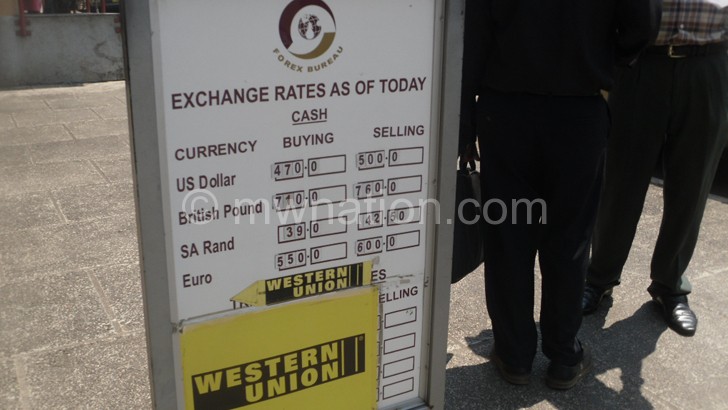RBM moves to tame Kwacha
- Imposes strict forex controls
The Reserve Bank of Malawi (RBM) has moved to arrest the kwacha’s recent sharp fall—for which it blames traders’ speculative behaviour—by introducing measures that restrict banks from determining the day’s foreign exchange market price.

As of yesterday, banks were buying $1 at around K485 and selling it at K512, exposing a spread of K27, which the central bank has determined to be too wide and a sign of greed on the market.
However, with the new directive, it means the maximum margin for buying and selling of currencies relative to the kwacha will be five kwacha.
In a letter dated July 28 2015 to chief executives of all authorised dealer banks (ADBs) in the country, RBM Governor Charles Chuka advised them of the changes.
He advised banks of the revision of the guidelines for the foreign exchange trading activities put in place in November 2014, foreign currency exposure limits directive and the liquidity reserve requirement directive.
RBM spokesperson Mbane Ngwira yesterday said the central bank has moved in to bring order in the trading of the kwacha, which RBM claims is falling because of speculations.
Between July 1 and 29, the kwacha has fallen by around 12 percent against the dollar from being sold at K453 at the beginning of month to K509 as of yesterday, according to RBM figures.
“The banks are driven by greed. They are driven by profitsgains, which have resulted in increasing the trading price for kwacha. RBM’s move will help to bring orderly [trading of] the currency,” he said.
Ngwira said the current free-falling of the kwacha was a result of speculative tendencies being perpetrated by the banks as well as lack of competition among the ADBs.
He said: “We are just reinforcing existing regulations.”
In the letter, RBM spells out that, with immediate effect, the exchange rate spread between buying and selling exchange rates shall not exceed K5 for all trading currencies at any point.
This then would mean the daily movement of kwacha would not go beyond K5 per day.
On liquidity reserve requirement ratio, RBM says: “In calculating Liquidity Reserve Requirement [LRR] for foreign currency deposit balances, such balances shall be converted to Malawi kwacha equivalent using ADBs’ own selling rates [including intra-day revised rates] or the market average selling rate during any LRR observance period, whichever is higher.”
RBM has also instructed all banks in the country to base their opening foreign exchange trading rates at the previous day’s average margin.
The central bank also directed that all banks are free to make intra-day changes to their opening rates provided a deal of $250 000 (or equivalent) has been executed.
“…but such intra-day changes shall not cumulatively exceed plus/minus 0.5 of the opening rates,” reads the directive.
Commenting on the developments, University of Malawi (Unima) economic expert based at The Polytechnic in Blantyre, Abel Mwanyungwe, said although the move to control the margins was good in the sense that it will prevent uncertainty and promote predictability on the exchange rate market, there is a risk that the policy would lead to the creation of parallel or black markets again.
On the other hand, Ben Kaluwa, an economics professor based at Unima’s Chancellor College in Zomba, welcomed the development as a good move to regulate the financial market.
He said the commercial banks were making a lot of profit out of foreign exchange which made them feel less compelled to concentrate on their core business—lending.
Soon after ascending to power by constitutional order in April 2012, former president Joyce Banda loosened government’s grip on the kwacha, devaluing the currency against a dollar from K168 to K250 and subsequently floated it.
That move helped to sharply lower exchange rate margins between the official rates and those of ADBs.






Now here is RBM awake and alive!!! Keep this up and there shall be order in the financial market; no cashgate transaction going through without investigation of liquidity patterns that are anomalous to central bank trend predictions.